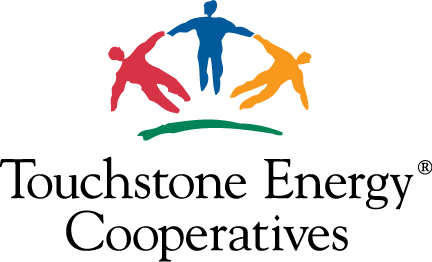At Consolidated Cooperative, it’s our mission to make sure you, as a consumer-member, know how to save money on your monthly electric bill.
So many devices use electricity—some that you wouldn’t even think of! Read on for easy, low- or no-cost ways to save around your home or business.
Heating:
- Check furnace filters every month and replace them when they’re dirty. Dirty filters make your unit work harder and less efficiently, wearing it out before its time.
- Install a programmable thermostat so you can lower the heat and raise the air-conditioning when no one is home.
- In the winter, set your thermostat to 68 degrees during the day and 55 degrees at night.
- Time to replace your furnace? Select a high-efficiency furnace or a heat pump. You could also look into installing a geothermal unit. While geothermal systems usually cost more up front, they save energy and money in the long run. Check our rebates page for incentives before you buy.
Air Conditioning:
- Ceiling fans can move air and allow you to set your thermostat higher during warm weather. Just remember that fans cool people, not rooms, so the last person out should remember to shut it off.
- Set your thermostat to 78 degrees or higher – make use of those ceiling fans to help bear the heat.
Water Heating:
- Repair leaky faucets as soon as they start to drip.
- Set your water heater to 140 degrees if you have a dishwasher, or 120 degrees if you don’t.
- Install low-flow shower heads, which reduces the amount of water your tank needs to heat.
Appliances:
- Check for the energy efficiency rating when buying a new appliance – the higher the better. If it doesn’t have an official rating, look for the yellow tag that tells you how much it might cost to operate the appliance for one year. Learn more about energy efficiency ratings for various appliances at Energy.gov.
- Remind the kids (…and yourself) to keep refrigerator and freezer doors shut – no lingering in front of the fridge to debate on a snack choice.
- Have an old refrigerator? Maybe it’s time for a new one. Old refrigerators can use up to twice the amount of energy as a modern one.
Lighting:
- Replace your regular lightbulbs with compact fluorescent bulbs. These last up to ten times longer.
- Always turn off lights that aren’t being used.
Outdoors:
- Use motion sensor and photocell lighting outdoors so you don’t have to remember to turn lights off when you head inside.
- Install awnings and shades on windows facing the south and west to block the sun in the summer. Remember to remove them in the winter to let the heat in.
- Plant shade trees strategically to avoid the sun’s hot glare – just remember to never plant under electric lines. Visit the Arbor Day Foundation’s “right tree, right place” page to learn which varieties to plant for the best use in the best place on your property.
Windows:
- Close insulated drapes during the day in the summer to keep out the heat. In the winter, close them at night to keep the heat in.
- Replacing your windows? Look for energy-efficient ones with double panes.
Weatherproofing:
- Use weather stripping around all windows and doors to stop drafts from coming in or going out.
- Inspect caulking around windows for any cracks or open spots and re-caulk as needed.
Cooking:
- To keep your house from getting too hot during cooking:
- Plan your meals so that you’re cooking several dishes in the oven at once, rather than just one item.
- Use a grill outdoors or a microwave indoors to cut down on oven heat – you’d be surprised what you can cook on a grill or in the microwave!
Laundry:
- Wash only full loads of laundry.
- Use cold water for all but the dirtiest loads.
- Air dry or line dry clothes whenever possible.






